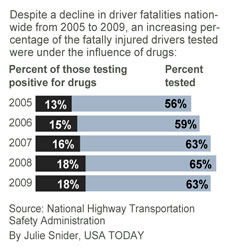Bruce Holloway was turning into his driveway in Mount Juliet, Tenn., in April 2009, when he was struck and killed by Brian Duffey.
Duffey was driving 80 mph with alcohol and painkillers in his system, according to police and court records.
"He was already home," said Holloway's fiancée, Mary Loving. "It's so unfair."

Duffey pleaded guilty to aggravated vehicular homicide and was sentenced to 22 years. He was one of a growing number of heavily medicated Americans who get behind the wheel every day.
According to a National Highway Transportation Safety Administration (NHTSA) report released Tuesday, one-third of all drug tests on drivers killed in motor vehicle accidents came back positive for drugs ranging from hallucinogens to prescription painkillers last year.
The report, the agency's first analysis of drug use in traffic crashes, showed a 5-percentage-point increase in the number of tested drivers found to have drugs in their systems since 2005. The increase coincided with more drivers being tested for drugs, the report shows.
Gil Kerlikowske, director of the Office of National Drug Control Policy, said the numbers are "alarmingly high" and called for more states to address the problem of driving and drug use.
Seventeen states have some form of such laws, according to NHTSA: Arizona, Delaware, Georgia, Illinois, Indiana, Iowa, Michigan, Minnesota, Nevada, North Carolina, Pennsylvania, Ohio, Rhode Island, South Dakota, Utah, Virginia and Wisconsin.
Although much research has been done on alcohol's effects on driving, little has been done on the impact of drugs on driving, researchers say. The NHTSA analysis doesn't address whether the drugs were at levels that would impair driving. Plus, the data are reported by the states, which vary widely in how often they test for drugs, the report notes.
Jim Lavine, the president of the National Association of Criminal Defense Lawyers, said drug-test results don't always pinpoint when the person took the drug: It could have been days or weeks ago.
The lack of research presents a problem for lawmakers, adds Scott Burns, executive director of the National District Attorneys Association. "With respect to illegal substances, the answer seems fairly easy: 'You can't drive with cocaine on board,' " he says. "The tougher question becomes, 'What do you do with prescription drugs?' "
Don Egdorf of the Houston Police Department's DWI task force says many people abuse prescription drugs. "If you have tooth pain, they give you Vicodin. You might develop a tolerance," he said. "You might end up taking two instead of one."
David Strickland of NHTSA recommends better state records of crashes involving prescription drugs.











